Table of Contents
Espresso Exposed: Uncovering Caffeine Content for Coffee Connoisseurs (Facts & Tips)
Whether you sip casually or savor every drop as an espresso connoisseur, one question brews above all: how much caffeine lurks in a shot of espresso? The answer? It’s a bit of a caffeinated enigma. While you might hear a standard figure tossed around, the reality is that caffeine levels can dance across a spectrum, influenced by the beans, the grind, the machine, and even the barista’s flair.
In this article, we’ll unpack the essentials: discover how much caffeine hits the mark in a typical shot, what factors sway the stats, how it stacks up against other coffee delights, and tips for savoring caffeine responsibly.
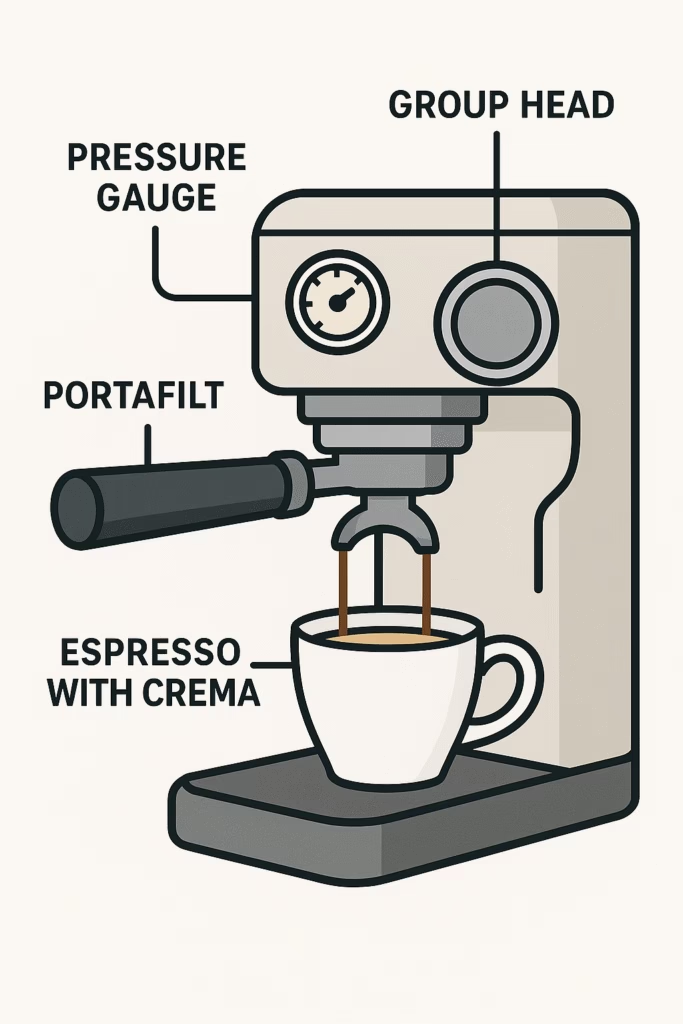 What is Espresso, Anyway?
What is Espresso, Anyway?
Espresso isn’t merely defined by the type of coffee bean or roast; it represents a strong brewing method. By forcing hot water (at a sultry 90–96°C) through a tightly packed puck of finely ground coffee under considerable pressure (9 bars or more), a rich, concentrated shot of coffee when brewed, it features a rich layer of crema on top.
Though petite in size, espresso packs a punch—in both flavor and caffeine.
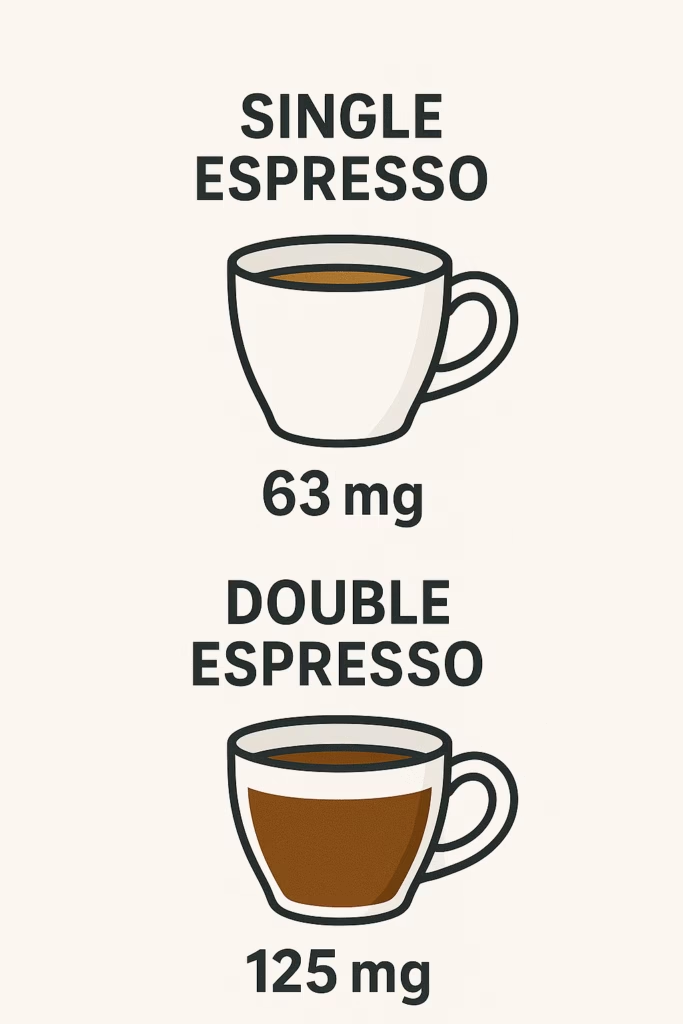 How Much Caffeine is in a Shot of Espresso?
How Much Caffeine is in a Shot of Espresso?
A typical shot of espresso (1 oz) contains between 30 to over 100 mg of caffeine, with an average of about 63 mg. A double shot, affectionately dubbed a doppio, is the café norm, boasting about 125 mg of caffeine—though it can soar to 150–185 mg depending on calamity in preparation.
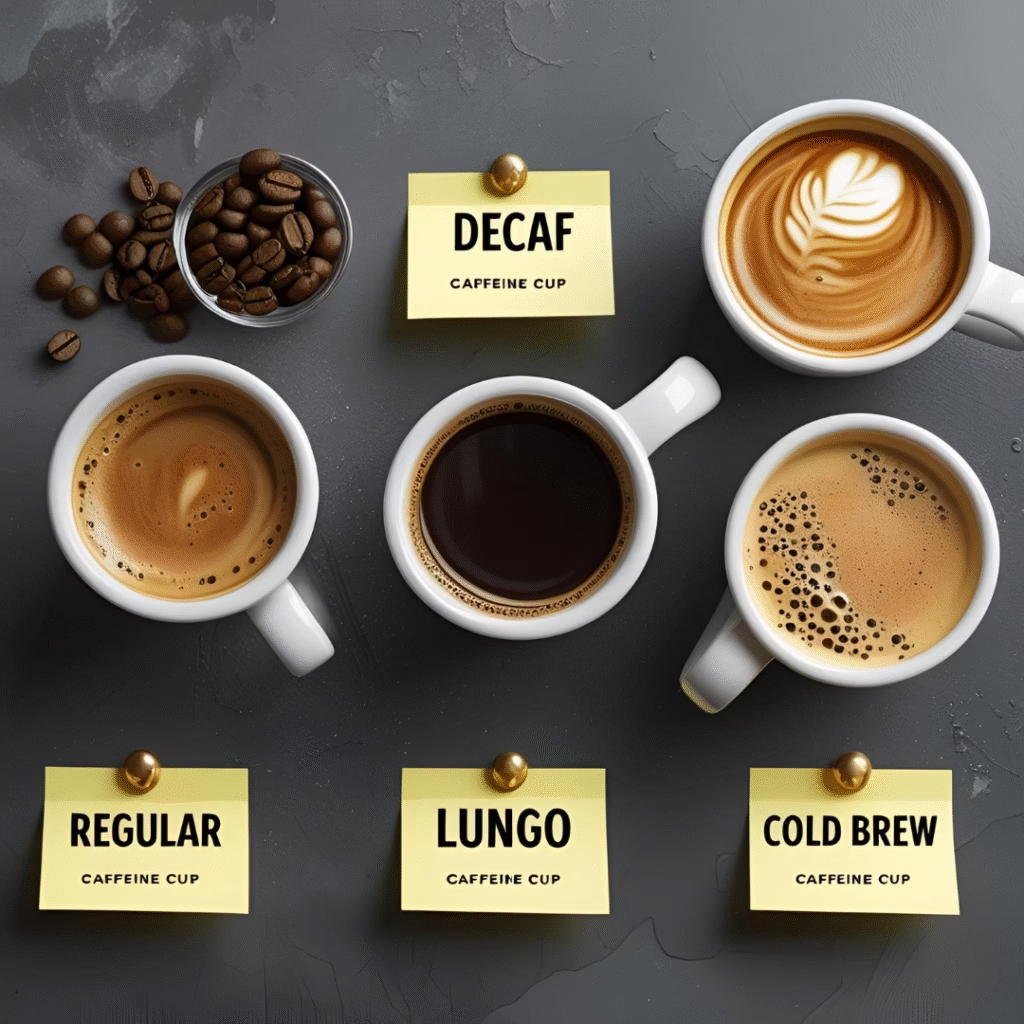 Quick Snapshot of Espresso Shots:
Quick Snapshot of Espresso Shots:
| Shot Type | Volume | Caffeine (Approx.) |
|---|---|---|
| Single Shot | 1 oz | 63 mg (30–100 mg) |
| Double Shot | 2 oz | 125 mg (60–185 mg) |
| Ristretto | 0.75 oz | 50–60 mg |
| Lungo | 1.5 oz | 70–90 mg |
Why Does Espresso’s Caffeine Content Vary?
1. Coffee Bean Type (Arabica vs. Robusta)
Arabica beans have 1.2–1.5% caffeine.
Robusta beans? They’re the heavyweight champions at 2.2–2.7% caffeine—almost double!
Many espresso blends sneak in some Robusta to elevate caffeine, enhance crema, and keep costs in check.
2. Roast Level
Light roasts retain more caffeine by weight since roasting reduces both moisture and some caffeine content.
Dark roasts may appear less dense, so you often use more by volume—balancing the scales.
While the type of roast doesn’t greatly change the caffeine levels, it does have a supplementary effect.
3. Grind Size and Dose
Espresso demands a fine grind. The finer the grind, the more surface area—leading to maximum caffeine extraction.
A single shot uses approximately 7–9 grams of coffee, while a double shot requires 14–18 grams.
4. Extraction Time
The sweet spot for a shot is 25–30 seconds.
Pulling shots too fast risks a caffeine lackluster.
Shots extracted too long (lungo) might yield more caffeine but can taste a tad bitter.
5. Machine Pressure and Water Temperature
Most machines crank at 9 bars of pressure.
Premium machines or barista finesse can dial up pressure or temperature, possibly extracting more caffeine in each shot.
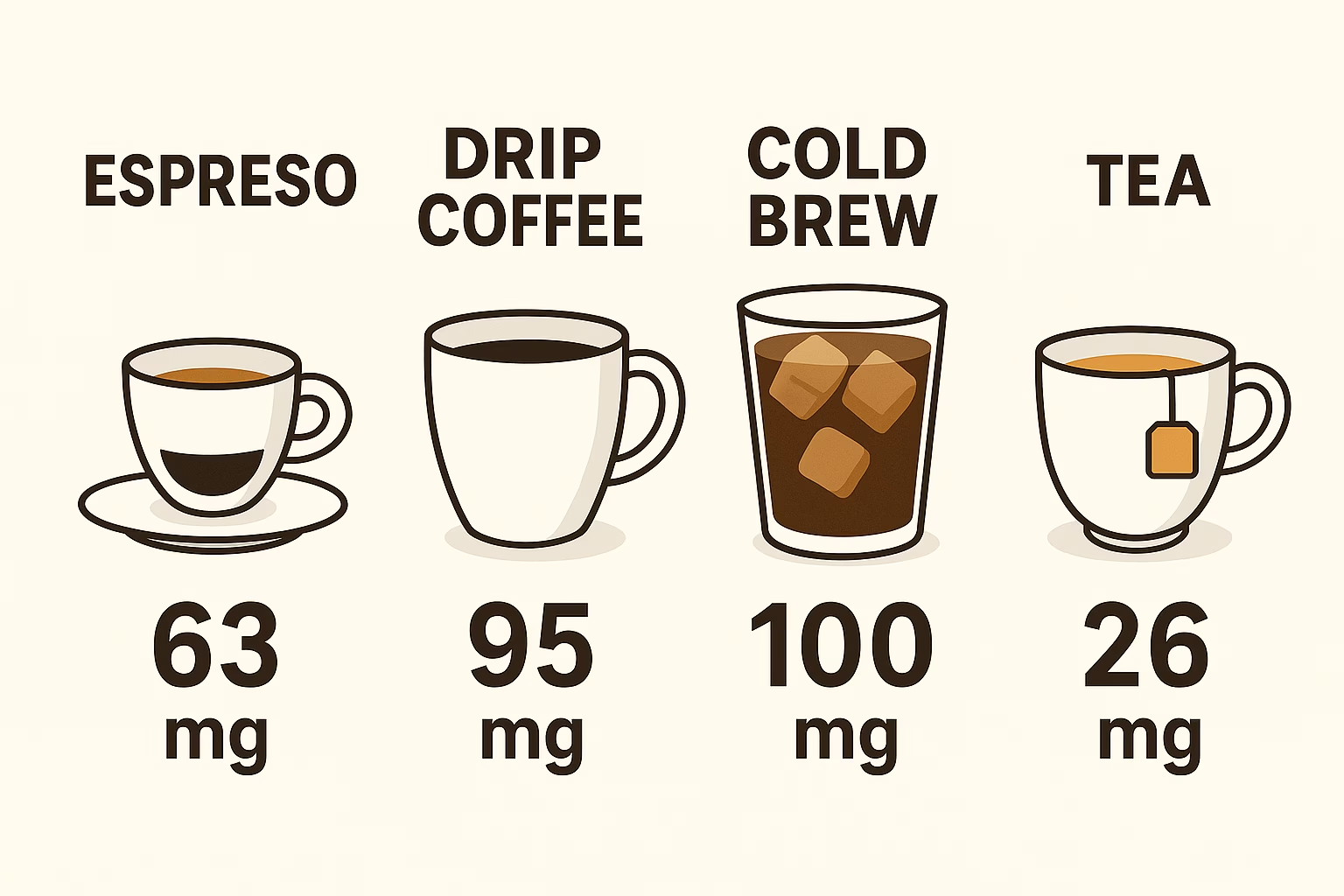 Espresso vs. Other Coffee Liberties
Espresso vs. Other Coffee Liberties
Let’s stack up espresso against other caffeinated companions:
| Beverage | Serving Size | Caffeine (Approx.) |
|---|---|---|
| Espresso (single) | 1 oz | 63 mg |
| Espresso (double) | 2 oz | 125 mg |
| Drip Coffee | 8 oz | 95–200 mg |
| Cold Brew | 8 oz | 100–200 mg |
| Instant Coffee | 8 oz | 60–90 mg |
| Decaf Espresso | 1 oz | 3–10 mg |
| Green Tea | 8 oz | 25–45 mg |
| Black Tea | 8 oz | 40–70 mg |
| Energy Drink | 8 oz | 80–160 mg |
Despite its concentrated power, espresso has less total caffeine than a full cup of drip coffee.
Busting Common Espresso Myths
Myth #1: Espresso outranks coffee in caffeine.
Truth: Ounce-for-ounce, yes. But drip coffee often packs a greater total punch.
Myth #2: Dark roast means more caffeine.
Truth: Darker roast ≠ stronger caffeine. Light roasts usually retain more caffeine by weight.
Myth #3: Decaf means zero caffeine.
Truth: Decaf espresso still brings 3–10 mg per shot, enough to stir sensitive systems.
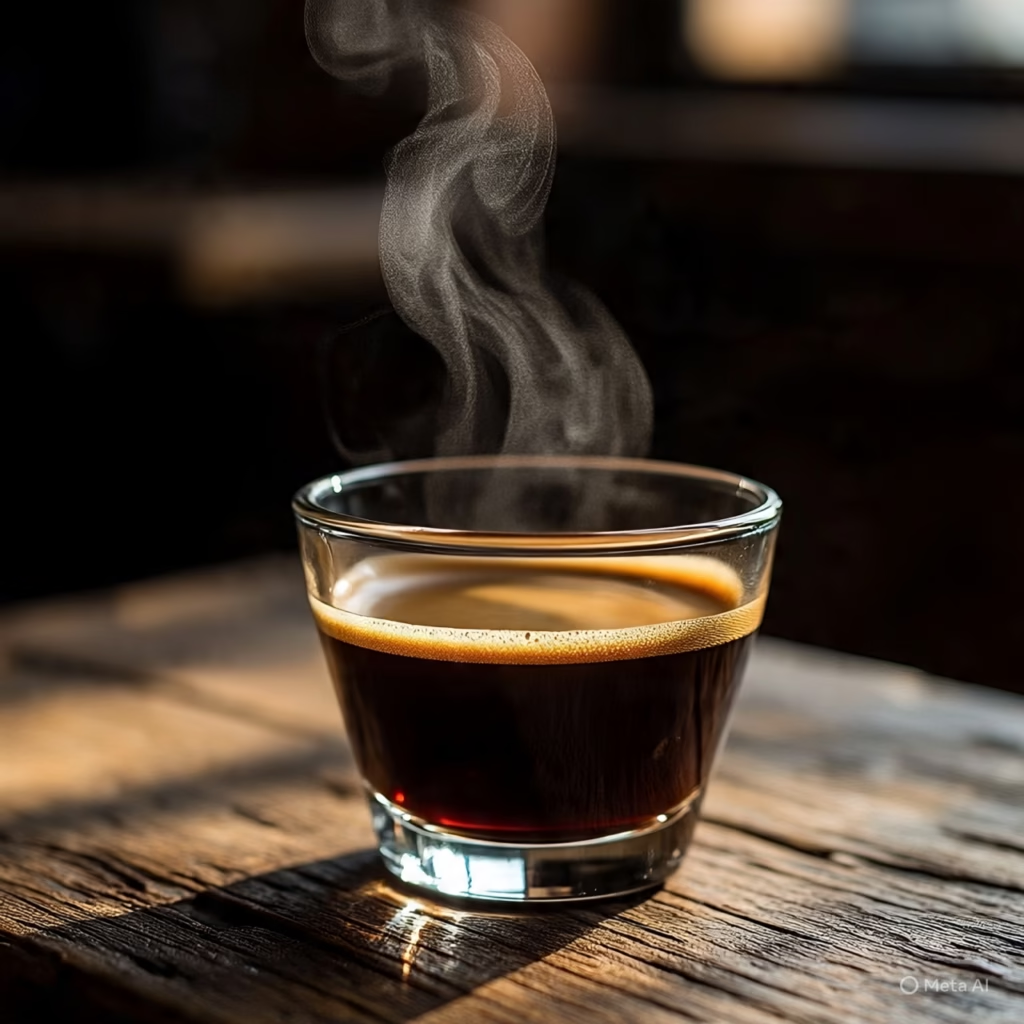 How Much Espresso is Safe for Consumption?
How Much Espresso is Safe for Consumption?
According to health guidelines from the FDA and Mayo Clinic, most healthy adults can safely indulge in:
Up to 400 mg of caffeine per day. That’s roughly:
5–6 single espresso shots
2–3 double shots
4–5 cups of brewed coffee
Exceeding that might lead to unwelcome effects:
Jitters
Insomnia
Increased heart rate
Anxiety
Digestive disturbances
For Expectant Mothers:
Health authorities recommend no more than 200 mg/day of caffeine—around 1–2 espresso shots.
Caffeine Management Tips
Know your dose – Inquire with your barista about their bean selection and shot volume.
Stick to single shots if caffeine’s a concern.
Explore decaf for late-night cravings or when reducing intake.
Space out your shots—don’t rush your espresso enjoyment throughout the day.
Keep an eye on additional caffeine sources (tea, soda, chocolate, supplements).
Final Thoughts: Caffeine Content in Espresso
To sum it all up:
A single espresso shot holds ~63 mg of caffeine.
A double shot typically delivers 125–150 mg.
Caffeine content fluctuates based on beans, roast, grind, dose, and brew time.
Despite its bold punch, espresso may contain less caffeine per serving than a cup of drip coffee.
Most adults can comfortably enjoy 3–5 shots per day based on personal tolerance.
So, the next time you savor that rich little shot of espresso, you’ll know just what kind of buzz awaits!

Pingback: Starlink in Pakistan | Benefits, Challenges & Impact - Ideas | Trends
Pingback: How Many Grams Are in a Pound? | Exact Conversion + Conversion Chart
Pingback: Elementor #454 - coffeea2z.com